If you’re using or considering Skuad for global workforce management, you’re already taking a streamlined approach to hiring international employees and contractors. Skuad provides EOR services in over 160 countries and is known for affordability, fast onboarding, and an emerging market focus. However, as your business scales or demands more specialized features—like deeper integrations, legal infrastructure, or advanced mobility support—you may find Skuad’s offering limited. That’s when exploring Skuad alternatives becomes essential to ensure your global hiring strategy remains agile, compliant, and fully equipped for expansion.
In this 2025 guide, we explore the top 8 Skuad alternatives and competitors. Each platform stands out with unique strengths like regional depth, automation, broader integrations, or transparent pricing. We’ve included comparisons, key features, pricing, and pros & cons tables to help you choose the right solution.
Table of Contents
- What Does Skuad Provide?
- Why Should You Consider Skuad Alternatives?
- What Are the Best Skuad Alternatives?
- Top 8 Skuad Competitors & Alternatives in 2025
- Detailed Comparison of Top 8 Skuad Alternatives (2025)
- Common Mistakes to Avoid When Switching from Skuad
- How to Choose the Best Skuad Alternative
- Why Choose Asanify Over Skuad?
- FAQs
What Does Skuad Provide?
Skuad is a fast-growing Employer of Record (EOR) and contractor platform that enables companies to hire global talent in over 160 countries without setting up legal entities. Tailored for startups and SMBs, it offers an affordable and scalable way to manage international teams, with built-in compliance and onboarding tools.
Skuad simplifies remote hiring by handling local payroll, taxes, and benefits while generating compliant offer letters and contracts. Its integrated time tracking and approval flows help companies manage contractors and full-time employees efficiently. The platform is fully compliant with GDPR, SOC 2, and ISO standards, ensuring data security across borders.
Core Features:
- EOR and contractor hiring in 160+ countries
- Integrated time tracking and approval workflows
- Localized payroll, taxes, and benefit compliance
- Country-specific employment contracts
- Fast offer letter and onboarding document generation
- GDPR, SOC 2, and ISO-compliant infrastructure
Skuad is particularly suited for teams expanding into Asia, Africa, or Latin America who need fast onboarding, essential compliance, and lean global HR operations—without the complexity or cost of enterprise solutions.
Why Should You Consider Skuad Alternatives?
While Skuad positions itself as a streamlined, affordable solution for global hiring, especially in emerging markets, our industry research and feedback from HR teams suggest that certain operational and feature limitations may prompt businesses to seek alternative EOR providers. These concerns are often more noticeable as companies scale or expand into legally complex or highly regulated regions.
Drawing from verified user reviews and direct input from global teams, we’ve identified recurring patterns in client concerns—ranging from service limitations and infrastructure gaps to platform flexibility.
Client Observations: Key Challenges Faced by Skuad Users
Limited Product Integrations
One of the most frequently cited drawbacks of Skuad is its limited native integrations with popular HR, accounting, and payroll software.
- No Plug-and-Play Compatibility: Users report the inability to connect Skuad seamlessly with tools like BambooHR, QuickBooks, or SAP—forcing manual data exports.
- Restricted API Access: For teams with custom HR tech stacks, the lack of open APIs can slow down operations and limit visibility across systems.
Lack of Visa and Mobility Support
While Skuad handles basic EOR and contractor tasks well, users have noted a lack of support for international employee relocation or visa sponsorships.
- No End-to-End Mobility Support: Businesses hiring across borders report challenges in obtaining legal relocation assistance or visa documentation through Skuad.
- Work Permit Complexity: For roles requiring intra-country transfers or specialized work permits, companies have had to engage third-party immigration advisors outside of Skuad’s network.
Minimal Customization for Benefits & Contracts
Companies with mid-to-senior hires often expect flexible benefit plans and tailored contracts—something Skuad doesn’t fully support.
- One-Size-Fits-All Contracts: Some users describe offer letters and contracts as too standardized, with limited scope for tailoring key clauses.
- Limited Benefit Modularity: There’s minimal support for structuring equity options, tiered insurance plans, or performance-linked perks that many competitors now include.
Service and Support Concerns
Smaller support teams can result in slower onboarding timelines or a lack of proactive assistance—especially in high-compliance markets.
- Generic Onboarding Workflows: Users have expressed the need for more localized onboarding assistance and real-time HR support.
- Reactive vs. Proactive Support: Unlike providers offering dedicated customer success managers, Skuad’s model relies more on documentation and reactive channels.
No Built-In IP or Equity Management
As companies move from early-stage hiring to strategic expansion, they often need legal tools for IP transfer and equity tracking—areas where Skuad falls short.
- Missing IP Transfer Protocols: Several global employers have flagged the absence of native IP assignment protections.
- Equity Plan Limitations: Unlike Deel or Remote, Skuad lacks dedicated features to facilitate employee equity programs, vesting schedules, or ESOP compliance.
While Skuad is a reliable entry-point platform for global hiring, especially in developing regions, its lack of infrastructure for integrations, mobility, and legal complexity makes it a less suitable choice for businesses with advanced needs. Companies looking for faster onboarding, dedicated visa support, flexible contracts, or built-in legal tools often benefit from exploring more robust EOR alternatives with stronger regional coverage and enterprise-ready capabilities.
Note: These insights are compiled from verified user feedback, case studies, and firsthand consulting experience with global employers who have evaluated or migrated away from Skuad.

What Are the Best Skuad Alternatives?
Here are the top alternatives to Skuad in 2025. Each platform offers something different—whether it’s deeper legal coverage, better regional specialization, advanced integrations, or tailored onboarding experiences.
Top 8 Skuad Competitors & Alternatives in 2025
1. Asanify
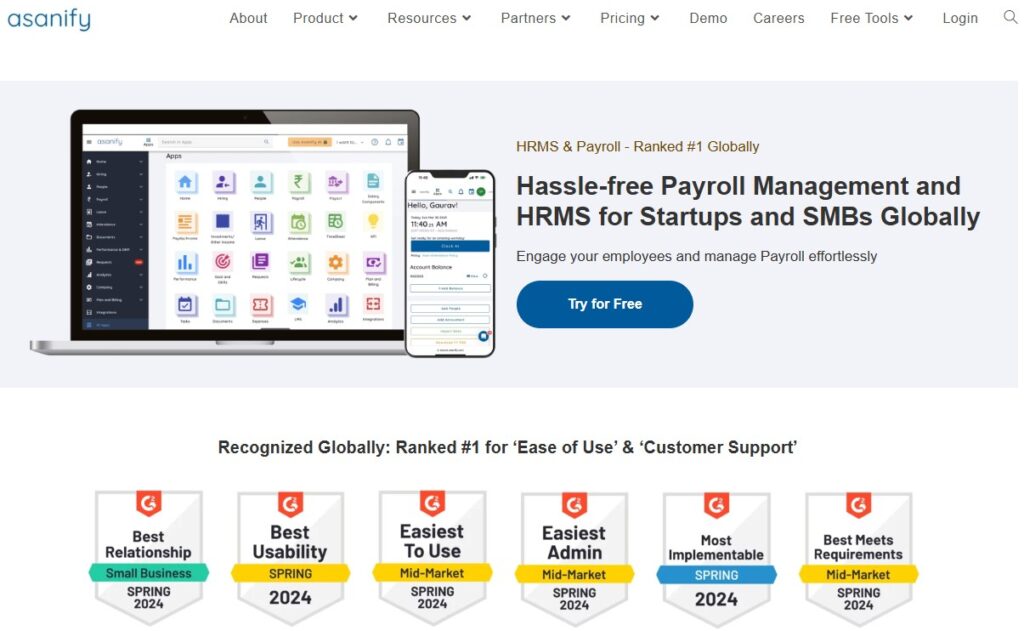
Asanify offers fast, compliant EOR services tailored to India, UAE, Singapore, and the Philippines. Built specifically for startups and SMBs, the platform prioritizes regional compliance, fast onboarding, transparent pricing, and hands-on local support. Asanify enables businesses to scale teams in APAC and MENA regions without worrying about entity setup or legal complexities. It also supports contractor payouts in multiple currencies, and provides end-to-end assistance for visa sponsorship and immigration compliance.
Key Features:
- Localized EOR for India, UAE, Singapore, and the Philippines
- End-to-end payroll: PF, ESI, gratuity, TDS
- Onboarding in 5–7 business days
- Visa and immigration support
- Local HR advisors for real-time assistance
- Multi-currency contractor payouts
Pricing:
- EOR: $299–399/employee/month
- Contractors: $29–49/contractor/month
- No setup fees
| Pros | Cons |
| Transparent pricing, no hidden fees | Coverage limited to APAC & MENA |
| Fast onboarding within 1 week | Fewer third-party integrations |
| Strong local HR compliance support | Smaller global partner ecosystem |
| Visa and contractor support included | Less brand awareness globally |
G2 Rating: 4.8/5
2. Deel
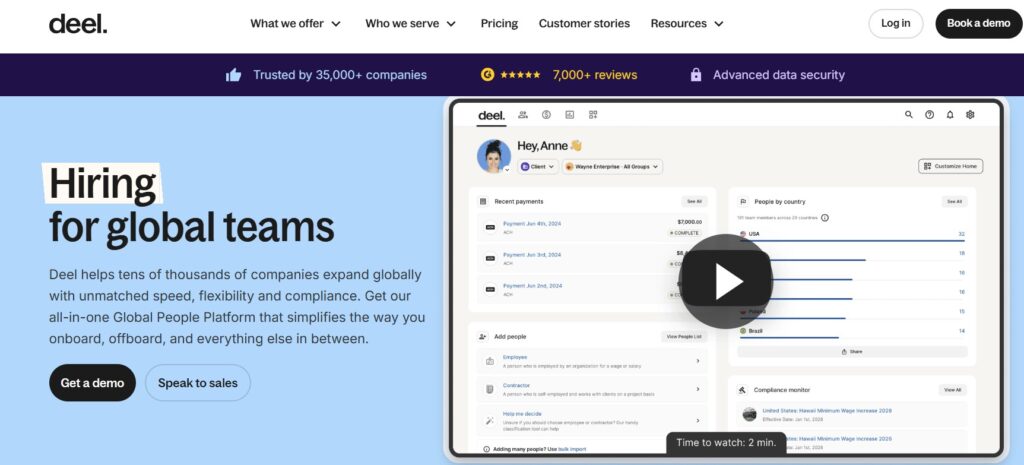
Deel is a globally recognized EOR and contractor management platform operating in over 100 countries. Known for its intuitive UI, legal infrastructure, and deep integrations, Deel caters to startups and enterprises alike. It includes built-in equity and IP protection features, a vast library of compliant contract templates, and seamless payroll and tax handling per local laws. Deel is particularly popular for its extensive integrations with major HR and finance tools.
Key Features:
- EOR and contractor management in 100+ countries
- Localized payroll, tax, and compliance
- Equity and IP transfer support
- Country-specific contracts and templates
- Integrations: BambooHR, Netsuite, QuickBooks
Pricing:
- EOR: From $599/employee/month
- Contractors: $49/contractor/month
| Pros | Cons |
| Strong legal and compliance tools | Higher pricing for small businesses |
| Excellent dashboard and UI | Advanced features may cost extra |
| Broad international coverage | Customer support wait times vary |
| Many integrations available | Not ideal for hyper-local compliance |
G2 Rating: 4.7/5
3. Rippling
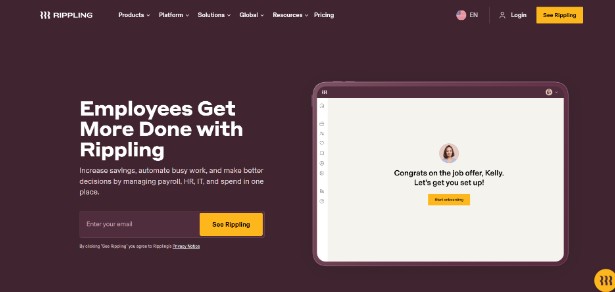
Rippling is an all-in-one platform integrating HR, IT, and finance operations with global EOR capabilities. It allows businesses to manage devices, automate onboarding, and run payroll across countries—all from one unified dashboard. Rippling is well-suited for mid-sized to large organizations needing a robust infrastructure that extends beyond HR into IT asset management and workflow automation.
Key Features:
- EOR + Global payroll support
- HRIS, time tracking, and onboarding
- IT device provisioning and de-provisioning
- 600+ app integrations
- Expense tracking and compliance tools
Pricing:
- EOR: $500–600/employee/month
- Contractors: $29/contractor/month
- Core HR platform: From $8/user/month
| Pros | Cons |
| Unified HR, IT, and finance suite | Steeper learning curve for small teams |
| Over 600 integrations | May be too complex for basic EOR use |
| Excellent automation and security | Pricing lacks transparency |
| Device and asset management | Not focused on emerging markets |
G2 Rating: 4.6/5
4. Remote
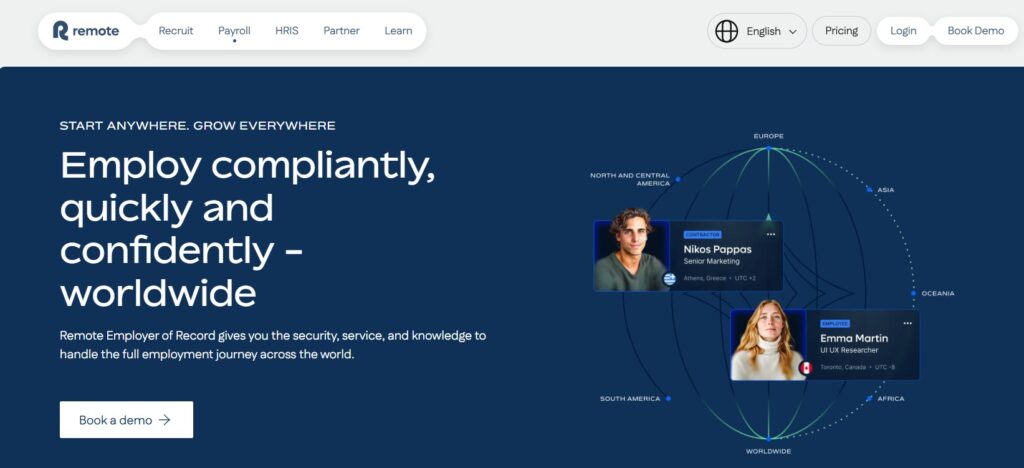
Remote offers flat-rate pricing and full ownership of legal entities in 70+ countries, making it a highly transparent and secure platform for international hiring. It excels in providing IP and equity protections, localized payroll services, and reliable contract templates tailored to local laws. Remote is a strong choice for startups and mid-size companies looking for predictability in pricing and stronger legal safeguards.
Key Features:
- Owned entities in 70+ countries
- EOR and contractor hiring
- Equity and IP protections
- Local benefits, PTO, and payroll tools
- Customizable contract templates
Pricing:
- EOR: $599/employee/month
- Contractors: $29/contractor/month
| Pros | Cons |
| Transparent flat-rate pricing | Onboarding speed varies by country |
| Strong IP and equity support | Lacks deep customization for some benefits |
| Intuitive and clean UI | Support inconsistencies in some regions |
| Entity-owned model ensures reliability | Not ideal for niche emerging regions |
G2 Rating: 4.6/5

5. Oyster HR
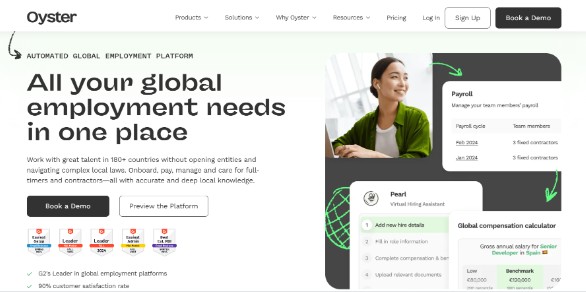
Oyster is designed with remote-first companies in mind. It provides EOR coverage in 180+ countries and focuses on user-friendliness, digital onboarding, and simplified benefit management. It offers an intuitive dashboard and tools for managing time off, payroll, and document workflows. Oyster’s core value is delivering broad geographic reach through a simple, all-digital process.
Key Features:
- EOR and contractor hiring in 180+ countries
- Multi-currency payroll and benefits
- Time-off tracking and document workflows
- Country-specific onboarding support
Pricing:
- EOR: $599–699/employee/month
- Contractors: $29/contractor/month
- Setup: 1-month refundable security deposit
| Pros | Cons |
| User-friendly dashboard | Requires security deposit upfront |
| Broad geographic coverage | No live chat or phone support |
| Automated onboarding | Dependent on third-party providers |
| Time-off and benefit tracking built-in | Payroll delays reported in some regions |
G2 Rating: 4.4/5
6. Papaya Global
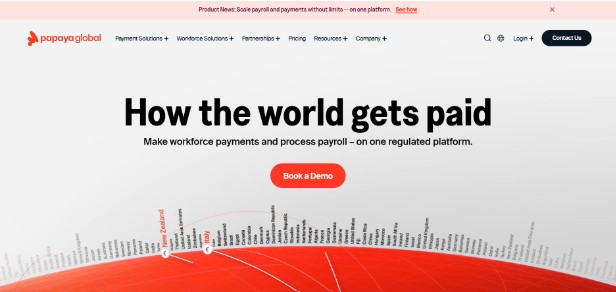
Papaya Global offers enterprise-grade global payroll and HR services in 160+ countries. It features real-time workforce analytics, automation capabilities, and robust compliance infrastructure. While best suited for mid-to-large enterprises, smaller companies may find the platform’s costs and implementation requirements too high. It stands out for its analytics-driven insights and compliance engine.
Key Features:
- Payroll and tax automation
- Contractor and EOR support
- Compliance engine with alerts
- Benefits and insurance administration
- Real-time workforce analytics
Pricing:
- EOR: From $599+/employee/month
- Setup and legal fees extra
| Pros | Cons |
| Strong automation and compliance | Expensive for startups and SMBs |
| Enterprise-level data visibility | Long implementation cycles |
| Analytics and real-time dashboards | Hidden fees for add-ons |
| GDPR, SOC 2, ISO certified | Less flexibility for localized hiring |
G2 Rating: 4.5/5
7. Velocity Global
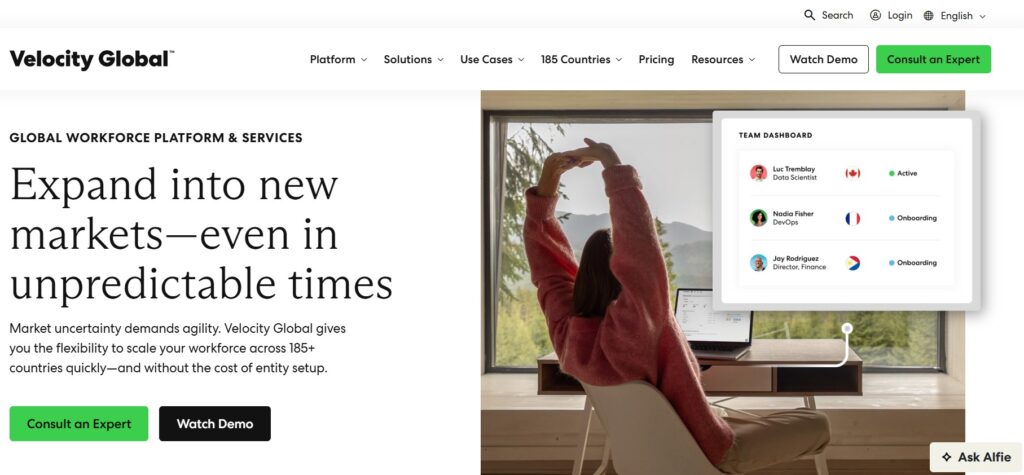
Velocity Global is built for large enterprises and multinational firms requiring high-touch support, mobility services, and legal infrastructure. It operates in 185+ countries, with owned entities in 50+, and provides deep advisory on immigration, benefits, and global payroll strategy. It is ideal for corporations expanding into multiple regions at once.
Key Features:
- EOR in 50+ owned-entity countries
- Visa, immigration, and mobility advisory
- Local HR experts and payroll teams
- Global Work Platform for unified ops
Pricing:
- EOR: $600–800+/employee/month (custom quotes)
- No contractor support
| Pros | Cons |
| High-touch onboarding and HR support | Premium pricing for smaller teams |
| Visa and mobility support included | No contractor management |
| Enterprise compliance infrastructure | Requires discovery call for pricing |
| Ideal for global-scale organizations | Slower implementation in some regions |
G2 Rating: 4.5/5
8. Globalization Partners (G-P)
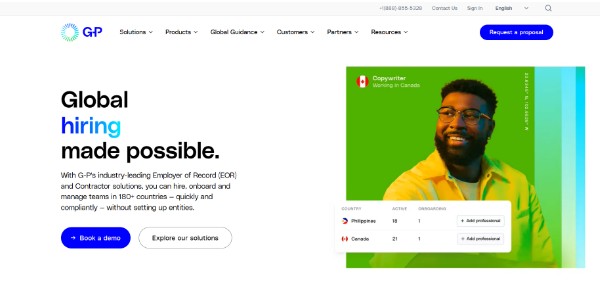
Globalization Partners (G-P) is one of the oldest and most comprehensive EOR platforms in the world. With owned legal entities in 180+ countries, it provides unmatched legal compliance, immigration assistance, and global HR services. It is particularly effective for enterprises needing highly customized benefits, strict data security, and strategic hiring support.
Key Features:
- Owned entities in 180+ countries
- Local tax, labor, and HR support
- Immigration and visa processing
- Custom benefit packages
- ISO 27001 and SOC 2 certified
Pricing:
- EOR: ~15% of salary (minimum $1,500/month)
- No contractor support
| Pros | Cons |
| Deep legal and HR expertise | Most expensive among EORs |
| Fully owned infrastructure | Not suitable for lean companies |
| High security and compliance levels | No support for contractors |
| Global enterprise-ready platform | Complex onboarding flow |
G2 Rating: 4.6/5
Detailed Comparison of Top 8 Skuad Alternatives (2025)
To help you find the best alternative to Skuad, we’ve compared the top platforms based on key factors like pricing, regional strengths, G2 ratings, and ideal business fit. This snapshot makes it easier to identify which solution aligns best with your global hiring goals in 2025.
| Platform | G2 Rating | EOR Price | Region Focus | Best For |
| Asanify | 4.8 | $299–399/month | India, APAC, MENA | Startups in emerging markets |
| Deel | 4.7 | $599/month | Global | Full compliance + integrations |
| Rippling | 4.6 | $500–600/month | US, Global | IT + HR automation |
| Remote | 4.6 | $599/month | Global | Flat pricing + IP protection |
| Oyster HR | 4.4 | $599–699/month | Global | Remote-first teams |
| Papaya Global | 4.5 | $599+/month | Global | Analytics and automation |
| Velocity Global | 4.5 | $600–800+/month | Global enterprise | Legal-heavy global hiring |
| Globalization Partners | 4.6 | $1,500+/month | Global enterprise | Enterprise with legal complexity |
Common Mistakes to Avoid When Switching from Skuad
Switching from Skuad to another EOR provider can unlock more features and better regional support—but only if done carefully. Avoid these common mistakes to ensure a smooth transition.
A rushed migration can lead to compliance gaps, payroll delays, or employee dissatisfaction. Take the time to assess each provider’s strengths and align them with your long-term hiring strategy.
- Assuming all platforms provide visa or mobility services
- Overlooking integration with your HRIS, payroll, or finance tools
- Ignoring total costs like offboarding fees and employee benefits
- Expecting uniform onboarding timelines across different countries
- Choosing without checking contract terms or flexibility options
How to Choose the Best Skuad Alternative
When evaluating Employer of Record (EOR) providers, it’s important to look beyond just pricing. A reliable partner should offer the right mix of compliance, scalability, and support to help you grow globally with confidence.
Key Factors to Consider When Choosing an EOR Provider
- Strong local compliance with labor laws and payroll rules
- Fast onboarding, ideally within 5–7 business days
- Transparent, flat-rate pricing with no hidden fees
- Integrates with your existing HR and finance tools
- Support for visas, contractors, and IP protection
- Real-time, responsive customer support
- Scalable across multiple countries with flexible contracts
- High data security with SOC 2, ISO, and GDPR compliance
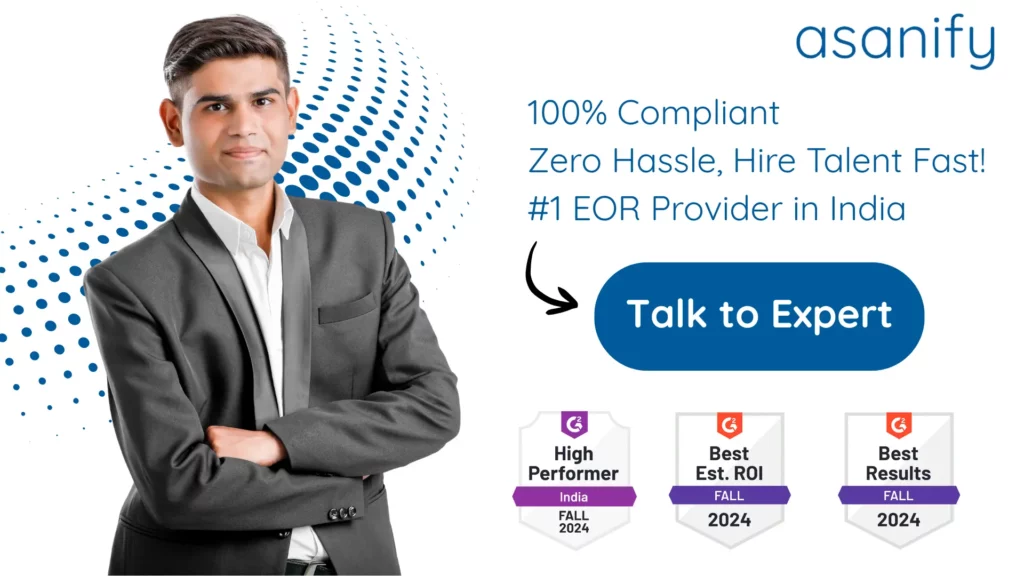
Why Choose Asanify Over Skuad?
Asanify is a leading Skuad alternative for companies looking to hire talent in India, the UAE, and Southeast Asia. Designed specifically for startups and SMBs, Asanify offers a faster, more affordable, and compliance-ready solution for cross-border employment. It stands out with localized payroll, deep tax and labor law expertise, and flexible support for both full-time employees and contractors.
- 5–7 day onboarding to get employees started without delays in India, UAE, Singapore, and the Philippines
- Transparent pricing with no hidden charges, surprise fees, or confusing rate structures
- Built-in visa processing and contractor support, making it easy to expand hybrid teams internationally
- Local HR advisors available on-demand to help with contracts, benefits, compliance, and labor law questions
- No setup charges or legal onboarding costs, making it ideal for budget-conscious global hiring
Asanify combines regional expertise with simplicity and speed, making it a top-rated Skuad competitor for growth-focused companies expanding into Asia and MENA.
FAQs
Asanify offers deep legal and payroll support across India, UAE, Singapore, and the Philippines.
Not always—larger firms may need more compliance, support, or integrations.
Rippling and Deel offer excellent automation and 600+ integrations.
Asanify, Velocity Global, and G-P include visa and immigration support.
Yes. Most providers support mid-year transitions with document portability.
Asanify and Remote typically onboard employees within 5–7 days.
Asanify and Skuad are the most cost-effective with no setup fees.
No. Velocity Global and G-P do not support contractor management.
Oyster HR is purpose-built for distributed, remote-first teams.
Deel, Remote, and Papaya Global offer dedicated IP/equity management tools.
Not to be considered as tax, legal, financial or HR advice. Regulations change over time so please consult a lawyer, accountant or Labour Law expert for specific guidance.




